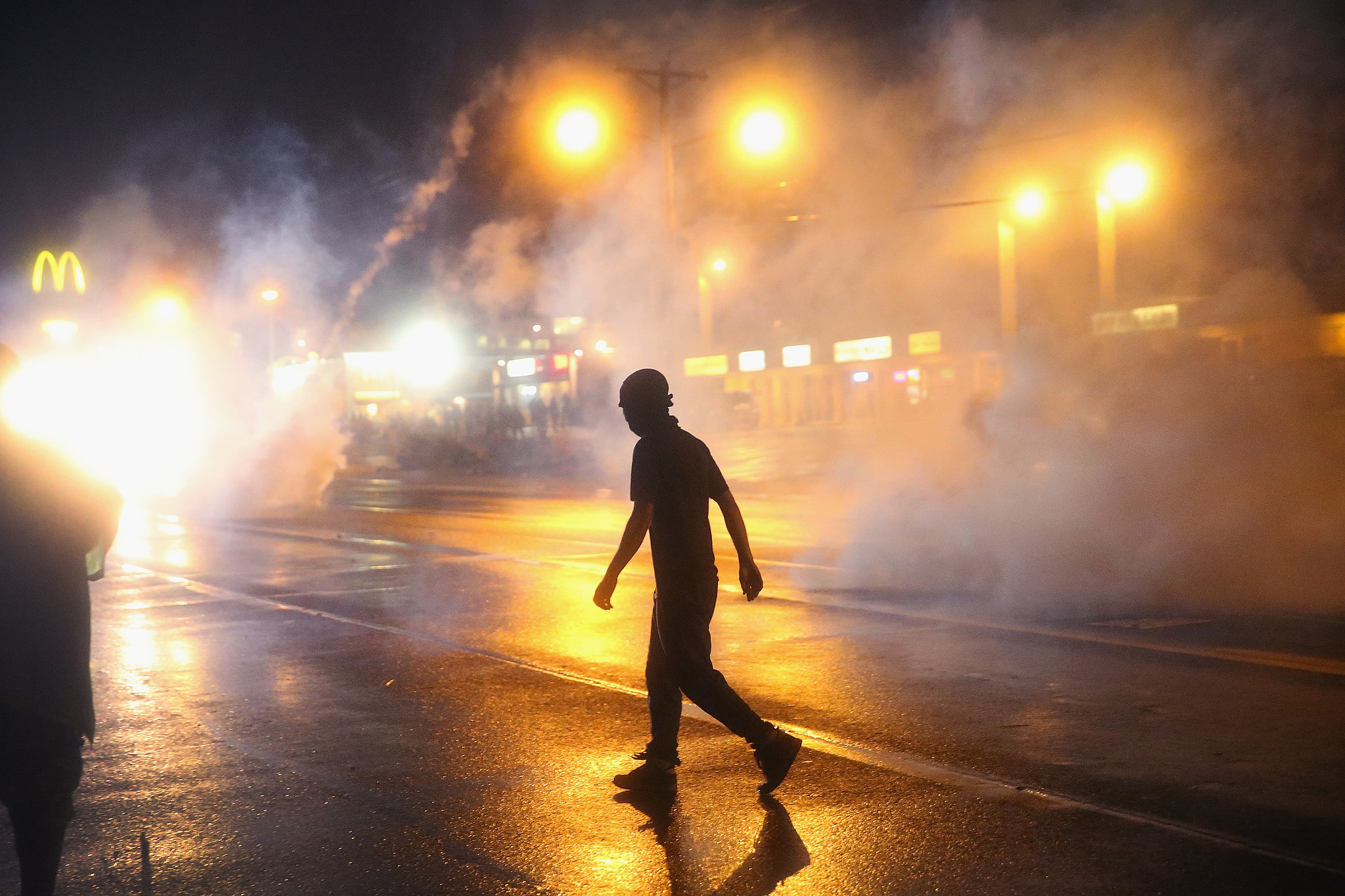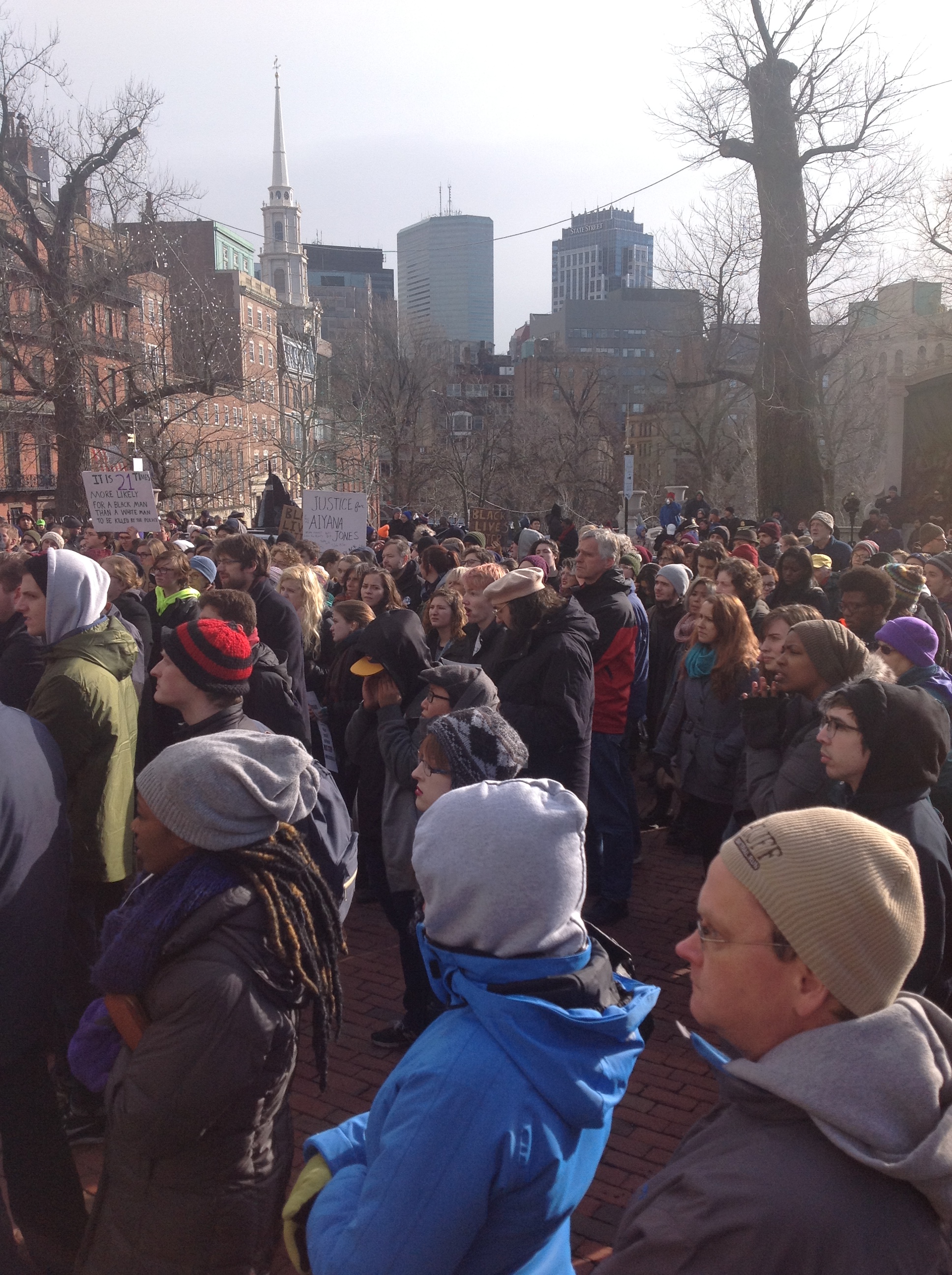 An image from the streets of Ferguson, Missouri after Michael Brown was killed by Officer Darren Wilson.
An image from the streets of Ferguson, Missouri after Michael Brown was killed by Officer Darren Wilson.
The film, Saving St. Louis, and the event that followed at the Charles Hamilton Houston Institute of Race & Justice was overly ambitious for a four hour slot on a Saturday afternoon, but a lot more interesting than what the Boston Globe reported ten days ago in their headline: “Activists Spar with Ferguson Mayor; police chief at Harvard.” While the Globe discussed the tension between stakeholders from Ferguson after unarmed Michael Brown was killed by police officer, Darren Wilson, the article missed some of the event’s best moments in their coverage.
The afternoon was multifaceted and much more vibrant than mere remarks shoved back and forth. First there was a moving introduction given by David Harris, the managing director of the Institute. Speaking of the times we live in when a black man can be choked eleven times by a white police officer, when use of clemency has dwindled across the country and U.S. mass incarceration stands at 2.3 million people, he said (and I paraphrase): We must name the problem if we live in a society that excludes some and not others, i.e. “Implicit bias invades every aspect of our society.” He rightly called the death penalty a way of claiming, “White lives matter rather than black lives matter,” and he shocked us when he said two people in U.S. prisons had faced execution on Martin Luther King’s birthday.
As Harris introduced the day’s events, he beckoned us to remember that “True citizenship is a dynamic of inclusion and participation. What we are learning from today’s protestors is that they are voting with their feet and not their ballots.” Whether or not you think that is a good thing, some of this important on-their-feet-participation was actually present before we walked into the hall where two hundred and fifty or so people had gathered for the event. A group from the Harvard Ferguson Action Committee protested the presence of Police Chief Thomas Jackson and Ferguson Mayor James Knowles whom they called “human rights abusers,” handing out flyers calling for their resignation.
Certainly some of this important anger helped set the stage for the day, but deep concern was behind the anger, a need to fight the kind of injustice that has fueled the Black Lives Matter movement. One such person invited to participate, show his film, and moderate one of the panels was Andre Norman. Boston native and a formerly incarcerated gang member, Norman has turned around his life to become a change agent. His interesting film on the St. Louis school system had been filmed long before the events in Ferguson. It spoke of the kind of inequities that we have seen in poor communities across this nation. The school system was failing and to help improve it, Norman aimed at connecting people, similar and different from himself, and he brought attention to the problem. The film shows us the views and work being done by gang leaders, inner-city activists, and corporate CEOs.
There were several interesting comments about Norman’s attempt to help St. Louis lose the designation of “the most violent city in America.” They included Reverend Charles Shelton of Urban Development Solutions in St. Louis, saying, “When the Mike Brown situation happened, that was already my reality and that was just showing you folks what was happening in my reality every day.” Dr. E. Lance McCarthy, co-founder of Black Silicon Valley and Ferguson 1000 Jobs, said “African Americans contribute a trillion to this economy but jobs they get are not equal to that. You cannot solve economic problems with social solutions.” In other words, people need jobs. Behind the failing schools was economic injustice. But of course, racism was and is also part of the picture.
As the discussion turned to the recent events, we heard from Dianne Wilkerson, Massachusetts former state senator, who has her own checkered past as both a beloved and effective legislator—the first black woman elected to serve in Massachusetts— and also a person who as served time for public corruption charges. The Globe reported that she was “a civil rights attorney for the NAACP and in the Dukakis administration.” One of the most moving comments she made in her introduction was “My personal triumph and victory is that I have kept my son alive.” Wilkerson spoke out about a recent action that stopped traffic on the highways of Boston, countering the idea that it was disruptive for no purpose, and adding that #BlackLivesMatter welcomes everyone to protest conditions that are inhumane and exclusionary.
Photo by Jean Trounstine from #BlackLivesMatter March in Boston
Wilkerson introduced several people who knew the pain of losing loved ones to police violence. Eric Garner’s nephew Gabriel Baez said he grew up with the same story as St. Louis. “The problem of police brutality is real. We have to change the relationship of police with the urban community.” Monalisa Smith from Mothers for Justice and Equality, founded by mothers who had lost children to violence, said “Hopelessness needs to be turned into solutions. It is not normal for kids to be killed or incarcerated.” She added about what goes on for kids in communities where there is violence, “Trauma impacts the ability to be educated.” In an amazing moment for the audience, as they absorbed how these speakers had lost sons and brothers and nephews, Dr. Leah Gunning Francis, Associate Dean for Contextual Education at the Eden Theological Seminary, asked, “What can we do as concerned people to bring compassion into the hearts of people who look at us every day and want us dead?”
The most important question of the day occurred when Dianne Wilkerson asked each of the final group of panelists one single question. These panelists included the mayor and the police chief, as well as: OOOPS, a local St. Louis artist and street poet (“battle rapper”) who has been on the front lines in Ferguson; Justin Hansford, a professor of law at St. Louis University; Derecka Purnell, a Harvard Law School student who went to Missouri to protest; Paul Muhammad, founder of Peace Keepers St. Louis; and Dave Spence, a St. Louis businessman. She asked: “What do you think is the problem,” and she was speaking about Ferguson, but of course, knowing its ramifications have echoed across the nation.
The answers were profound and why I needed this day at the Charles Hamilton Houston Institute. Professor Hansford said the problem is: “Black lives do not matter.” He pointed out that “Whenever killing happens and no one is held accountable, someone needs to lose their job.” And he asked the police chief and commissioner to resign. Echoing him, Purnell said “I think that whenever someone is killed by the police they need to go to trial. There is leadership that wants to hold on to power and not justify a broken system.”
The police chief got a cold shoulder from the audience when he said that the problem was “very long term poverty and lack of love in some people’s lives.” He added that he thought the country needed to “establish a national policy when an officer is involved in shootings… a transparent system…you have to talk right away. Police can’t kill someone and not explain why.” Likewise, the mayor was shunted when he ignored cries of “Racism” from the audience and said “Economics is the problem.” He added “I called fourteen elected officials to remove Bob McCullough. Our governor didn’t have the political courage.”
Muhammad said that the problem is “the disregard and dehumanization of black lives.” Speaking of the mayor and police chief and others like Bob McCullough, he added, “It was not personal and they did not feel it when Mike brown on the ground.” Muhammad feels that the racial divide in Ferguson and racial component across the country has to be addressed.
Ooops ended this panel with something that has stayed with me ever since. He said “The biggest problem is I always fit the description. Think about me getting pulled over with a gun in a car that I can legally have. We have to stay alive.”
I applaud the Institute for taking on so many important projects like this one, and for those of you who missed it, check out their website for future events.

